In this week’s eSkeptic:
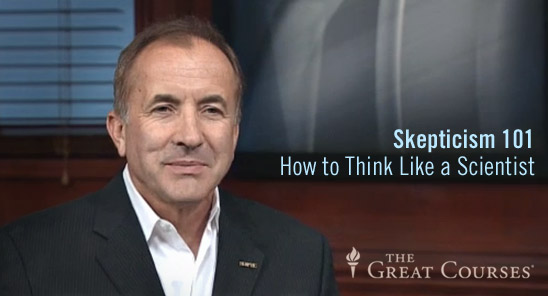
Skepticism 101:
How to Think Like a Scientist
a new Great Courses series by Michael Shermer

Nobel prize-winning physicist Richard Feynman said, “The first principle is that you must not fool yourself—and you are the easiest person to fool.” These words are no less insightful today than they were when he wrote them in 1985. Despite our best efforts, we are all vulnerable to believing things without using logic or having proper evidence—and it doesn’t matter how educated or well read we are. Our brains seem to be hardwired to have our beliefs come first and explanations for our beliefs second. And although we are skilled at recognizing the cognitive biases in other people’s thinking, we often have blinders on when it comes to our own.
But there is a method for avoiding these pitfalls of human nature, and it’s called skepticism. By using rational inquiry and seeing subjects from a scientific perspective, we can approach even the most sensitive claims with clear eyes to ultimately arrive at the truth. And today, the need for skepticism has never been more dire as superstition and magical thinking experience a resurgence in our society and around the world.
Get all 18 lectures
for only $24.95!
Order a Digital Download of Michael Shermer’s 18-lecture series Skepticism 101: How to Think like a Scientist and pay only $24.95 (reg. $99.95). On CD for only $39.95 (reg. $149.95)
Price may change without warning.
Professor Michael Shermer of Claremont Graduate University and Chapman University calls the hallmarks of skepticism the “best tools ever devised in human history for thinking about anything,” including life’s biggest questions. In Skepticism 101: How to Think like a Scientist, he reveals how to use these concepts and techniques to better comprehend the world around you. Over the course of 18 THOUGHT-PROVOKING LECTURES that will surprise, challenge, and entertain you, you will learn how to think, not just what to think—and you’ll come to understand why extraordinary claims require extraordinary evidence.
A Scientific Approach to Life
For the skeptic, the word “science” is used in the traditional sense and in a broader context that refers to the scientific method and its systematic and empirical way of looking at the world. Skepticism 101 outlines how science works and illuminates how it can help us differentiate between real science and pseudoscience, as well as between “scientific” history and pseudohistory—distinctions that have serious educational and political implications.
Fascinating case studies illustrate how you can apply the methods of skepticism to detect specious claims and faulty logic in any scenario you encounter. Among the topics you’ll inspect are
- the methodology employed by Holocaust deniers;
- arguments made by proponents of creationism;
- the biology of near-death experiences and the sensed-presence effect;
- psychic abilities and other “paranormal” phenomena; and
- how UFOlogists differ from mainstream scientists engaged in SETI, the search for extraterrestrial intelligence.
How Thinking Goes Wrong
As you learn how our brains work to form beliefs, you’ll examine the classic fallacies of thought that lead us to experience mistakes in thinking—particularly when it comes to finance—and to form bad arguments in favor of our beliefs. You’ll discover numerous ways even smart people deceive themselves.
- After-the-fact reasoning: A form of superstition that attributes an outcome to a previous action—such as a baseball player who believes his two home runs are the result of his not shaving
- Coincidences: Commonly seen as deeply significant, but actually nothing more than the laws of probability at work
- The either/or phenomenon: A tendency to dichotomize the world in a way that says if you discredit one position, the observer is forced to accept the other
- Tautology or redundancy: Occurs when the conclusion or claim is merely a restatement of one of the premises
You’ll explore how we maintain and reinforce our beliefs through a number of powerful biases that not only distort precepts to fit our preconceived concepts, but lead us to resist other viewpoints. From confirmation bias to hindsight bias to attribution bias, over a dozen of these cognitive heuristics are presented in this course to help you recognize them and avoid falling prey to them in the future.
Why You Believe What You Believe
Is there a God? Is there life after death? Is there a basis for morality without God? Skepticism 101 doesn’t shy away from controversial questions, nor does it give final answers. What it offers are methods and hard evidence for rationally evaluating various claims, positions, and “weird things”—as skeptics call unlikely claims with only anecdotal evidence—and an opportunity to understand why you believe what you believe.
Order Two series
and SAVE up to $205
Save up to $205 when you buy two series together: Michael Shermer’s 18-lecture series Skepticism 101: How to Think like a Scientist along with Steven Novella’s 24-lecture series Your Deceptive Mind: A Scientific Guide to Critical Thinking Skills. Available in:
- Audio CD format, or
- Digital Download.
Price may change without warning.
You’ll peel back the layers of conspiracy theories to examine the psychological principles that interfere with our ability to reason clearly about major events, then you’ll explore the powerful psychological forces that lead seemingly normal people to become members of cults. You’ll also take an intriguing look at the psychology and neuroscience of religion, including evidence that our religious preferences are a product of both our evolutionary heritage and our cultural histories.
Lessons from the World’s Most Prominent Skeptic
As the author of 10 books on science and skepticism, a monthly columnist for Scientific American, and the founding publisher of Skeptic magazine, Professor Shermer brings a wealth of experience, research, and insight to this course that few could match. This seasoned and captivating lecturer is a popular speaker on the TED Talks lecture circuit and is the executive director of the Skeptics Society, which sponsors the monthly Skeptics Distinguished Science Lecture Series at the California Institute of Technology.
Perhaps you’ve seen a self-help guru inspire his audience with a fire walk or witnessed a psychic giving a reading and thought there must be a logical explanation. Using empirical evidence and a scientific approach, Professor Shermer reveals the very of-this-world explanations behind these and other seemingly out-of-this world phenomena.
But more importantly, in Skepticism 101 he demonstrates how you can build a skeptical toolkit and apply this way of thinking to any claim or situation that arises.

NEW ON SKEPTICBLOG.ORG
The Rough Fist of Reason!
Daniel Loxton presents a 1916 detective story, “The Rough Fist of Reason”—one of the strange cases of a fictional skeptical investigator named Magnum, Scientific Consultant.
My Recent Token Skeptic Interview, Transcribed
Daniel Loxton shares an excerpt from the transcript of a conversation he had with Kylie Sturgess for her Token Skeptic podcast on the topic of skeptical history and the foundational principles of the skeptical movement.


Mitchell Moffit
Science, ASAP!
SKEPTICALITY EPISODE 207
Scientific laws, concepts, and theories can be difficult to understand. Thanks to the duo at ASAP Science, you can watch short, bite-sized videos on YouTube and learn some pretty cool facts. This week on Skepticality, Derek talks with Mitchell Moffit, one of the co-creators and producers of ASAP Science.
Get the Skepticality App
Get the Skepticality App — the Official Podcast App of Skeptic Magazine and the Skeptics Society, so you can enjoy your science fix and engaging interviews on the go! Available for Android, iPhone, iPad, and iPod Touch. Skepticality was the 2007 Parsec Award winner for Best “Speculative Fiction News” Podcast.
About this week’s eSkeptic
In a nation whose laws protect free speech we easily forget that many places in the world hold atheism and the expression of religious skepticism to be a crime—a thought crime—punishable by jail. The following article, by Dr. Avijit Roy, reminds us that we need to be vigilant in our quest for freedom of speech everywhere in the world.
Dr. Avijit Roy is a Bangladeshi blogger, published author, and prominent defender of the free thought movement in Bangladesh. He is an engineer by profession, but well-known for his writings in his self-founded site, Mukto-Mona—an Internet congregation of freethinkers, rationalists, skeptics, atheists, and humanists of mainly Bengali and South Asian descent. As an advocate of atheism, science, and metaphysical naturalism, he has published seven Bangla books, and many of his articles have been published in magazines and journals. His latest book, Obisshahser Dorshon (The Philosophy of Disbelief), has been critically well-received and is a popular book on science, skepticism, and rationalism.
The photos appearing below have been used with permission.
See Acknowledgements and Image Credits.
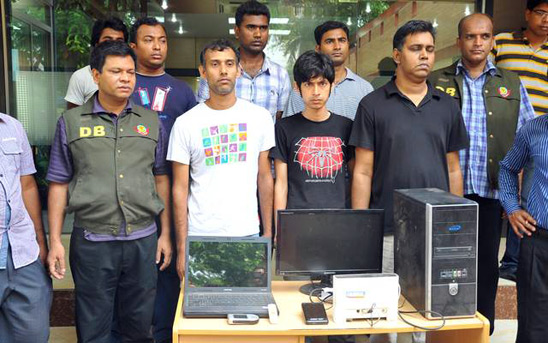
The Struggle of Bangladeshi Bloggers
by Avijit Roy
What comes to mind when you scan the picture above? A gang of thieves who have been caught red-handed, or perhaps a picture that border guards posted of some poachers that they have recently detained. Alas, this is a group of brilliant writers known as the Bangladeshi Bloggers; the items that are displayed in front of them—the bloggers’ own computers and laptops—have been seized and searched by Bangladesh’s law enforcement. What a nice catch our police force has made!
At times, I fall speechless when asked if I have anything to say about the sorry case of the writers in our country. So many readers like me read their writings with such devotion, using their articles as a means to enhance our knowledge as well as our own logic skills. Several weeks ago I was even personally acquainted with one of the accused “atheist” bloggers, Subrata Shuvo, who had wanted to publish one of his articles on Mukto-Mona (a site for freethinkers of mainly Bengali and South Asian descent which I use to moderate). His proposed story was on Mr. Shahidul Haque [aka: Shahidul mama (Uncle)], who was a freedom fighter of 1971. It was through Shuvo’s writing that I learned how S. Haque was the major eyewitness of the war criminal Kader Mullah’s trial. Since S. Haque was a guerilla fighter, he saw the brutal genocide conducted under Kader Mullah’s command. Haque was also an activist in the protests and riots of 1966 and of 1969.
Before reading Subrata’s story, I never knew a person such as Mr. Haque had existed—a person who is so passionate, brilliant, and brave, a person who loves his country more than I do. This fearless soldier came back from Sweden just to testify against Kader Mullah, in the hope that he and countless others would finally achieve justice. “I won’t complain against the tribunal, but the sentence (that Kader Mullah was only given life in prison) is simply outrageous,” said Mr. Shahidul, where many had expected the vicious criminal to be hanged until death. Shubrata’s writings covered various topics, examples of which are titled, “Interview: Ferdousi Priyovashini on freedom fighters & war children” and “Daily Shangram: their contribution on covering 1971’s 25th March.” Both articles were proof of the profound love that Shubrata felt for his homeland. There is no doubt that, because of youths like him, the Shahbag movement could awaken the people of Bangladesh.
And how does our government respond to his actions? Instead of praising or even acknowledging his patriotic contributions to the Bangladeshi community, they locked him behind bars. Their rationale? His “atheism.” After hearing about such horrific proceedings, I started reading Subrata’s blog on mukto-mona to see for myself why the government had taken such offense. To my surprise, I could not find a single entry indicative of the so-called radical atheistic mindset that he was being accused of. Well, Subrata did write an essay on Richard Dawkins, one of the famous atheists of our time. Even people with the vaguest interest in science are mesmerized with Dawkins’ writing and logical analyses. Just as a skilled piano player spellbinds us with his keys or as a poet captivates us with his lines, Dawkins’ logic entrances us with his in-depth explanations…and anyone can express gratitude towards him for this reason alone! I myself have done so several times. As I read Humyun Azad’s Shab kichu nashtoder Adhikare jabe (“All Will Go to the Rights of Evil”), or when I recite Bangladesher Katha (Story of Bangladesh), I encounter the same contentment as when I read Dawkins’ works. Should such feelings really be measured on a spectrum separating atheism and theism? Even Einstein, arguably the most celebrated man on the planet, abandoned the idea of a personal savior, saying, “I don’t try to imagine a personal God; it suffices to stand in awe at the structure of the world, insofar as it allows our inadequate senses to appreciate it.” The beauty and sublimity of Einstein’s words will no doubt affect a person’s mind, regardless of if he is an outspoken atheist or deeply religious.
Russell Pervez is another arrested blogger famous for his unique writing style in various Bangla blogs. His writings always reminded me of the panache of the late Christopher Hitchens, because both writers used their immense knowledge in history, politics, science, literature, and religion to produce quality works. In a recent newspaper article Arif Jebtik, the eminent blogger and columnist, wrote an essay in an online newspaper (BDNews24) under the title Ekmatro Bikalpa Bhalo Manushder Shakriyata (“The Only Alternative is the Activeness of a Few Good Men”)1. He began by asking why an exceptional scholar such as Russel would leave his comfortable and respectable life in the U.S. to teach kids science in Bangladesh. Russell loved Bangladesh so much, that he left America for Bangladesh with his two year-old-child, despite the fact that his wife was still busy finishing her Ph.D. He took his son with him to book fairs, cultural programs, and to Shahid Minar to show gratitude towards our martyrs. He left America’s high-paying corporate jobs and took over teaching science in school instead. Soon, his wife joined him in Bangladesh, and she started teaching as well. One instant, Russell was busy spreading love for his country and knowledge about the freedom war of 1971; the next minute, he is in jail, accused of being an atheist, which has suddenly become a punishable crime in our country.
The day after Asif Mohiuddin—another reputed blogger—was arrested and interrogated by the detective branch about his earlier protests against the raised fees that Jagannath University’s students had been afflicted with. His writing—which was heavily critical of religious dogma, bigotry and superstition—and his political activism angered the government, as well as marked the beginning of the threats he received from fundamentalists. These threats eventually led to action in mid-January this year. Mohiuddin was brutally stabbed and severely injured by three suspected but unidentified Islamist fundamentalists. When Asif returned, the BTRC (The Bangladesh Telecommunication Regulatory Commission) allegedly told the blog communities to stop spreading his messages. Complying with the threat, Somewherein, Bangladesh’s first Bangla language community blog site, ultimately banned Mohiuddin, who used to write there regularly (and was even 2012’s User Winner for “Best Social Activism Campaign” at the Deutsche Welle’s International Blog Awards)2. Now he is arrested. While Asif has been an object of criticism for a number of groups, many young freethinkers in Bangladesh look to him as a nonconformist idol who has fought against the tyrannical state machinery until the very end. Asif’s last status and a forceful writeup (published in richarddawkins.net just before he got arrested) about the arrested bloggers reads:
There was a time in the 17–18th century in Europe when women who excelled in knowledge, science and philosophy more than men were blamed for witchcraft and were burned alive by the churches and their theocratic government. Education and thus advancement for women has always been a threat for radicalism so this is why the church and the government indulged in burning the progressive women by branding them as witches. The exact same situation is in Bangladesh right now. The whole new generation who brought in a revolution in Bangla blog community with their advancement in science, philosophy and critical mind, who wrote against the religious fundamentalism and in favor of our great liberation war, freedom of speech, secularism and democracy will be burned alive just like witch-hunt in the late middle ages. I was threatened a lot when I spoke against government’s autocracy from so many other bloggers, but where are they now? Are they supporting the two headed snake government who acts secular but shelters the fundamentalists?”
Asif went to jail with his head held high. This was enough to give the government a reassuringly sharp slap in the face, courtesy of the blogger community.
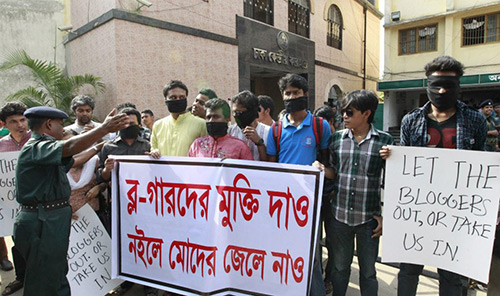
The teachers, students and online activists gathered in front of Dhaka Central Jail holding placards: “Either release the arrested bloggers from jail or put us into it.”
However, in the darkest of hours I still see a slither of light. Prominent citizens and intellectuals like Dr. Salahuddin Ahmed, Dr. Zillur Rahman Siddiqui, Dr. Sirajul Islam Chowdhury, Dr. Anisuzzaman, Dr. Ali Akbar Khan, Dr. Ajoy Roy, Qayyum Chowdhury, Ramendu Majumdar, Dr. Sarwar Ali, Advocate Sultana Kamal, Rasheda K Chowdhury, Khushi Kabir, M M Akash, Dr. Yasmin Haque, Dr. Iftekharuzzaman, Tarek Ali, Dr. Muhammad Zafar Iqbal, Shaheen Anam, and Robaet Ferdous stand boldly on our side. They have requested the government not to block free speech and free thinking3. “Everyone has the right to practice their religion, but nobody should block free speech”, they proclaimed. It provides me with some solace that even when the free thinking spirit is being gagged, we still have so many enlightened people on our side. Several days later, the teachers and students and online activists formed a human chain in front of Dhaka Central Jail on April 22, demanding release of four bloggers. They gathered there wearing black badges and masks and holding placards, some of which read, “Either release the arrested bloggers from jail or put us into it.”4
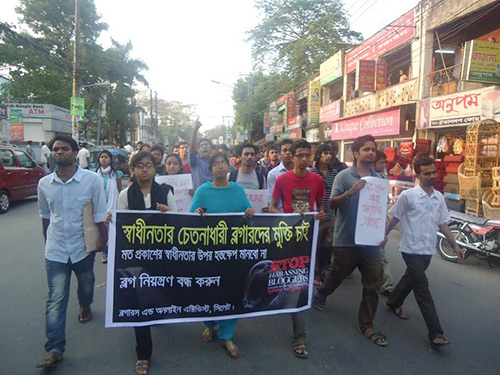
The rallies in Sylhet (a major city in north-eastern Bangladesh) are in support of Bangladeshi online writers and bloggers.
We also have the international support from a few influential organizations. IHEU, the world umbrella organization for freethinkers and humanists, issued a strong statement titled, “Government is stepping right into the trap set by these Islamic fundamentalists”5 . A few days later they issued another alert: ‘Call to action: Defend the bloggers of Bangladesh’6 . Atheist Alliance Int’l (AAI) also demanded immediate release of the bloggers. The American Humanist Society also sent a petition to the U.S. Ambassador to get involved. CNN, BBC, Huffington Post, and Slate published articles criticizing Bangladesh’s actions towards the bloggers. Psychology Today published an article on April 10, 2013 titled, ‘Atheism Shouldn’t Be a Crime: Blasphemy should be celebrated, not outlawed.’ In it, Dave Niose reminds us of the obvious, yet necessary, point that atheism should not be criminalized:
One of the many problems with the concept of protecting religion from defamation is that ideas (including religious ideas) cannot be defamed—only people can be defamed. If governments feel that any idea must be shielded from scrutiny, questioning, or even ridicule and satirical commentary, that idea must be extremely weak, or alternatively the society in question must be repressive.
This is why blasphemy should not be criminalized, but celebrated. Those subversive individuals with the bad manners to remind us that no idea is sacred—that governmental defense of any theology necessarily weakens the legitimacy of both the government and the theology—should be thanked for making us think and for reminding us that we live in a free, open society.
Nonbelievers are valuable contributors to society and deserve no inferiority complex or stigmatization, yet their government encourages it. “Theistic supremacy” is too often the official governmental line, only because politicians find it easy to pander to religious voters by exalting religious belief. It may not be akin to throwing atheists in jail, but it still isn’t right.
Amnesty International issued a statement titled, ‘Bangladesh: writers at risk of torture’. Center for Inquiry (CFI), a New York-based global secular group has requested the U.S. Secretary of State John Kerry to “pressure the government of Bangladesh to reverse its policy of arresting atheist bloggers who were critical to religion.” CFI sent a letter to Secretary Kerry and Ambassador-at-Large for International Religious Freedom Suzan Johnson Cook “to do all they can to raise public awareness of this situation.” Other influential organizations such as Free Society Institute of South Africa, Reporters Without Borders, Committee to Protect Journalists, Global Voice Advocacy, and several other bodies have also called for immediate release of the Bangladeshi bloggers and appealed to several other foreign authorities to press Bangladesh on the issue.7
Besides these organizations, many influential writers and activists, including Taslima Nasrin, Hemant Mehta, and Maryam Namazie, publicly expressed their support. Among them, the Iranian-born activist, commentator, broadcaster, and 2005’s Secularist of the Year award-winner, Ms. Namazie called for 25 April to be an international day to defend Bangladesh’s bloggers and activists.8 Dhaka University students and teachers have also called for a strike on April 25th to press for the release of the four bloggers. An international coalition of atheist and humanist organizations led by CFI also planned demonstrations in New York, Washington D.C., London, Ottawa, and other cities around the world on the same day9 . The rallies being organized by groups such as Center for Inquiry, American Atheists, and the International Humanist and Ethical Union were supposed to be held outside Bangladeshi embassies and consulates to demand the release of the bloggers who were arrested on charges of blasphemy.10
Then struck the Savar tragedy. An eight-story building collapsed on April 24th in Savar, a small town in the outskirts of Dhaka, killing at least 300 people and injuring more than 1,000. April 25th, the day after the tragedy, has been proclaimed the National Day of Mourning in Bangladesh. In effect, official protests to be led by CFI have been postponed to May 2nd. Dhaka University students and teachers also cancelled the strike anticipated for the 25th of April.11
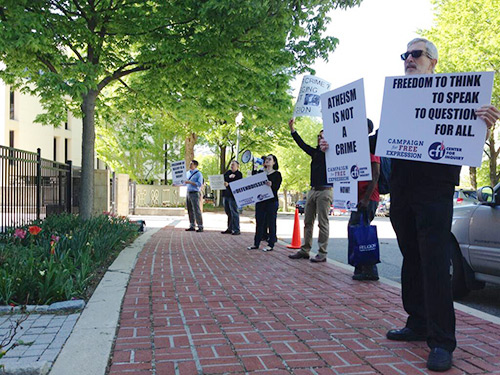
Worldwide Protest led by the Center for Inquiry (CFI) on May 2nd held outside the embassy of Bangladesh in Washington D.C.
However, several freethinking groups, including the American Atheists and Secular Coalition for America, decided to continue with the protests that were originally planned for April 25th, since the day had already been declared “International Day to Defend Bangladesh’s Bloggers.” American Atheists led protests at the consulate office in New York City and the embassy in Washington, D.C. (with assistance from the Secular Coalition for America). Defending his decision, American Atheists’ president David Silverman said,
My decision to continue…is based on the fact that I feel this is an urgent problem. People are in jail for doing nothing but self expression, and that is wholly immoral. This protest is weeks in the making, international in scope, and we aren’t canceling it because of an impromptu day of mourning imposed by the very people imprisoning atheists like us.
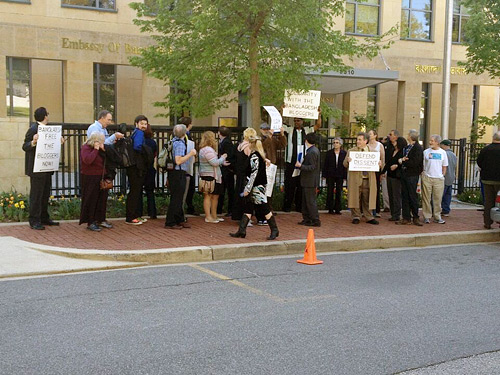
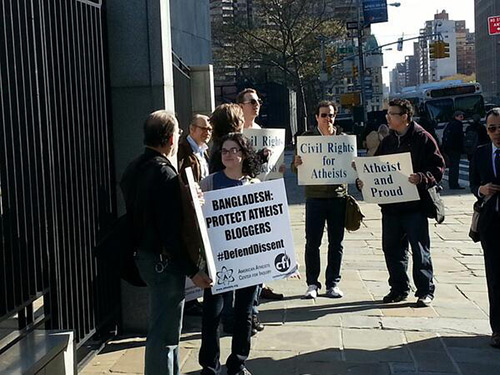
American Atheists rallies on Thursday (April 25) outside The Embassy of Bangladesh.
Maryam Namazie led another protest rally in Trafalgar Square in London. A day prior to the demonstrations, she wrote a powerful blog titled, “While we remember the dead, let us also remember those fighting to live.” In it, she expressed:
Today 25 April has been declared a day of mourning in Bangladesh for the victims of the nation’s worst factory disaster. … Today is also the International Day to Defend Bangladesh’s Bloggers, four of whom are imprisoned, and more than 80 others who face death threats by Islamists. Here too their safety and lives have been ignored by the Government. In both these cases, the Government has failed to defend fundamental rights. Unfortunately, it is too late for the many garment factory workers. But there is still time to save Bangladesh’s bloggers. The Government must act before it is too late. On 25 April, whist we remember the dead, we must also remember those who are fighting to live.
Protests in Columbia, MO also ensued. Members of local groups of skeptics, atheists, secular humanists, and agnostics convened on Thursday at the University of Missouri’s campus to be part of the global movement.12
The worldwide demonstrations on May 2nd were very successful. Several humanist groups (including Center for Inquiry, CFI-Canada, and the British Humanist Association etc.) took part in places as far-reaching as the U.S., Canada (Ottawa, and New Brunswick), the UK, and Bangladesh. A few particularly moving pictures are displayed below.
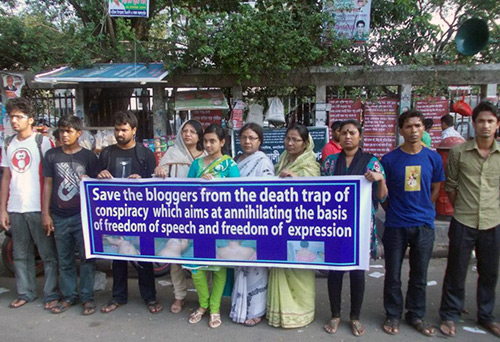
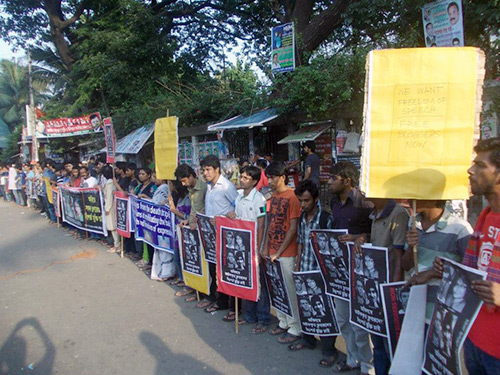
The activists and bloggers formed a human chain in front of Dhaka Press Club demanding release of four bloggers on May 2nd.
It is clear that international pressure against the Bangladeshi government is rising (please refer to my piece which can be found in BDNews24, an online Bangla newspaper, and in Mukto-Mona Bangla Blog). If Bangladesh does not change its course of action, it is clear that our country will not progress. Of course, only time will tell what direction it takes. If the bloggers are kept against their will, Bangladesh will be well on its way to being a fundamentalist autocracy; if it does, however, let the bloggers go in peace, there may be some hope for redemption. For now, the cards are in the government’s hands. ![]()
References
- Arif Jebtik, Ekmatro Bikalpa Bhalo Manushder Shakriyata (The only alternative is the activeness of a few good men), bdnews24.com (opinion); Published: 2013-04-04
- Bangladesh gags award-winning blogger, Deutsche Welle Report.
- Muktachintar poth ruddho na korar ahobaan, A Statement from prominent Citizens of Bangladesh; banglanews24.com, 05 Apr 2013
- Human chain in front of jail for release of bloggers, The Daily Star, April 23, 2013
- A Statement from IHEU: Arrests of “atheist bloggers” shows Bangladesh authorities are “walking into a trap set by fundamentalists”, 4 April, 2013
- IHEU Action Alert: Call to action: Defend the bloggers of Bangladesh, 9 April, 2013
- US body against blogger’s arrest, Staff Correspondent, bdnews24.com, Published: 2013-04-17
- Maryam Namazie, On 25 April 2013 we stand with Bangladeshi bloggers and activists!, http://freethoughtblogs.com
- Worldwide Protests for Free Expression in Bangladesh, Campaign for Free Expression, CFI.
- Kimberly Winston, Atheists Rally Around Jailed Bangladeshi Bloggers, Huffington Post, Posted: April 25, 2013
- Kimberly Winston , Atheists postpone protests after Bangladeshi disaster, The Washington Post, April 25, 2013
- Karyn Spory, Bloggers’ imprisonment sparks free-speech rallies, Columbia Daily Tribune, Friday, April 26, 2013
Acknowledgements and Image Credits
The author thank Aldrin Malakar for translating portions of the Bengali articles and Trisha Ahmed for corrections and final proofreading.
The author also thanks Mr. Gazi Nasiruddin Ahmed (Khokan), the News editor of BDNews24 for giving permission to use a photo that was published in bdnews24.com on April 2nd, 2013. Thank you to Mr. Michael De Dora, the director of public policy office of Center for Inquiry (CFI) for giving permission to use photographs of the demonstration held outside the embassy of Bangladesh in Washington, D.C. on May 2. Thanks to David Silverman, the President of American Atheist, for his permission to use photos of the demonstration by American Atheist in front of the embassy of Bangladesh on April 25th, 2013. Special thanks to Sazu, Ekush Tapader and Shariful Hasan for giving permission to use the photos of the demonstration in Bangladesh from their respective Facebook pages.









